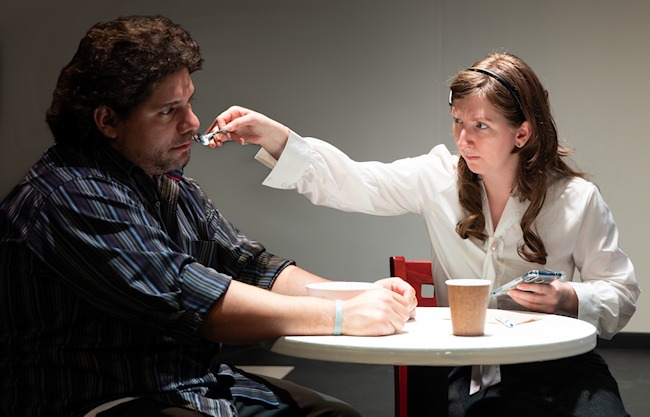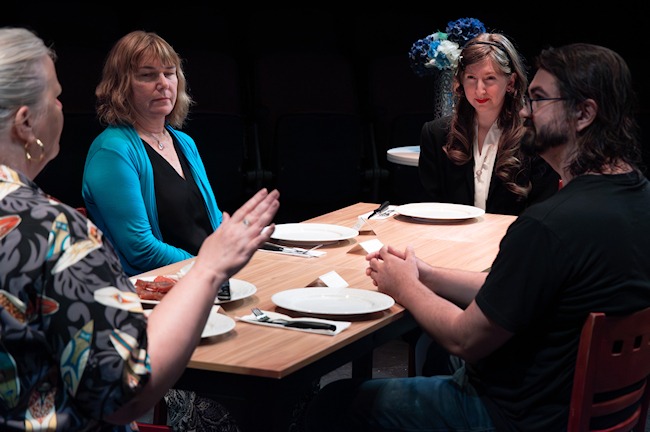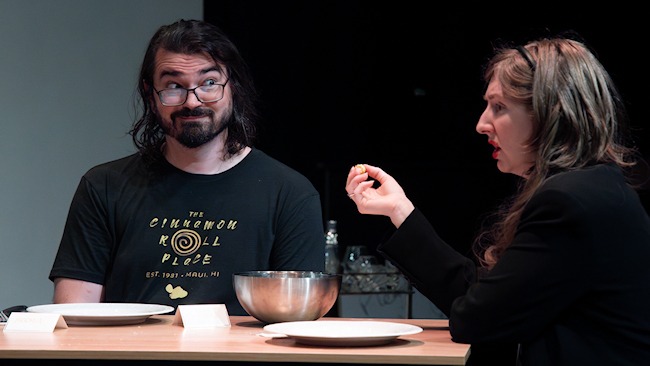by James O’Barr
Theater, from the beginning, has been a space for confronting death, and life’s existential questions. Shakespeare, in Julius Caesar (currently on the boards at Ashland), has much to say about both: “I come to bury Caesar, not to praise him,” quoth Marc Antony, “The evil that men do lives after them; the good is oft interred with their bones.” Fast forward to the current zeitgeist, and the evil that men, mostly men, are doing, from one side of the earth to the other—climate derangement, a new ICE age, nuclear proliferation, war crimes and lawlessness from sea to shining sea—looks very much like it will have enduring if not undying consequences. Olympia Little Theatre’s September 2025 production of Sarah Ruhl’s quintessentially quirky comedy, Dead Man’s Cell Phone, was directed by Kendra Malm and Toni Holm. It contained pertinent messages for today.

Olympia Little Theatre’s September 2025 production of Sarah Ruhl’s quintessentially quirky comedy, Dead Man’s Cell Phone, was directed by Kendra Malm and Toni Holm. Already performed, it contained pertinent messages for today. No spoiler alert necessary, the title says it all. At a café, when a man (Isaac Garfias) sitting alone at a small table, doesn’t answer his incessantly ringing cell phone, Jean (Kaidrin Cain), the woman at the next table, answers it herself, realizing only slowly that the man is dead. In the moment of recognition, staring into his transfigured face, Jean falls in love. She speaks to the corpse, and sits with him until an ambulance arrives. The dead man’s name, it turns out, is Gordon, and, Jean later discovers to her dismay, he sold body parts for a living. But to keep alive the reality of her newfound love object, Jean answers his calls and fabricates stories about his dying thoughts to lovers, business partners, and family, all of whom she eventually meets: Gorden’s brother Dwight (Derek Rutter), his mother Mrs. Gottlieb (Laurie O’Brien), his wife, Hermia ( Dayna Childs), and The Other Woman/Stranger (Cyan Townley).

Dead Man’s Cell Phone premiered at the Wooly Mammoth Theatre Company in 2007 and won the Helen Hayes Award for Outstanding New Play. Death, in Ruhl’s plays, often serves as a catalyst for transformation and a deep dive into themes of love, memory, and the porous boundary between life and death. In Eurydice (directed by Lauren Love in a luminous production at South Puget Sound Community College in 2021) death is the central event, allowing Eurydice (Oedipus’s beloved) to journey to the underworld and explore her relationship with her deceased father while confronting the limits of love and memory. In Dead Man’s Cell Phone death is an ongoing, transformative force that people grapple with, even using cell phones in the afterlife. Other Ruhl plays, like Letters From Max, directly explore grief after a friend’s untimely death, further emphasizing death’s profound impact.

Ruhl has achieved a level of fame and good fortune over the years, getting widespread recognition and a Pulitzer Prize nomination for The Clean House in 2004, and winning a MacArthur Fellowship (“genius award”) in 2006. She has gone on to create a prodigious body of work that includes not only plays but memoirs, poetry, essays, and an opera libretto based on Eurydice. Ruhl, in an interview discussing Dead Man’s Cell Phone, said,“Cell phones, iPods, and computers will change people in ways we don’t understand.” Olympia Little Theatre offered us a welcome opportunity to experience her wildly imaginative attempt to play with that unknowing.
Photos by Scott Ellgen.

